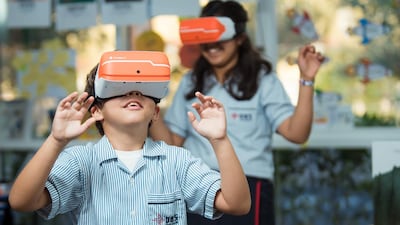Artificial intelligence is changing the landscape of teaching in Dubai, say some of the region's leading experts.
Earlier this week, Sheikh Hamdan bin Mohammed, Crown Prince of Dubai, announced plans to “upskill all teachers in the Emirate in artificial intelligence”.
Educators are already using platforms to plan lessons, give pupils feedback, and take on administrative tasks.
Schools across Dubai are also training teachers in AI to help them plan modules and complete administrative work, allowing teachers more time to focus on pupils.
“Our aim is to create an educational system that equips our students with future-ready tools and provides an optimal learning environment supported by AI technologies,” Sheikh Hamdan wrote on Wednesday.
Heads of schools in the city told The National that teachers were already undergoing training in the use of AI.
“We're going to continue investing in upskilling our teachers and continue investing in providing courses and content for our pupils because AI is not a one-off workshop, it's got to be continuous,” said Baz Nijjar, principal adviser of education technology at Gems Education.
“For sure, it’s going to support in improving planning or reducing the time consumption for planning.
“It's going to improve administrative tasks of data tracking and analysis and it's going to help personalise activities so teachers can work towards highest standards.
“But, rather than them manually doing that, now they're just having to review content that is being curated and make sure they put their own personal touches.”
One of their programmes is called Teachers Lead Teachers which, as the name suggests, has teachers training peers through best practice.
“When they see a fellow teacher use a certain tool and they are showed an example of how it's used, they then want to learn because they see how it can reduce their workload, or how they can improve pupil-related outcomes or can give support with their planning,” said Mr Nijjar.
“A lot of the administrative tasks and the personalisation is supported by AI, and it's ever evolving. This is just the beginning of the journey.
He said the use of AI, “gives time back to the teachers to focus more on their personal skills, because the skills that AI is not going to replace is what we as humans can offer, which is our personal skills such as collaboration or communication”.
“It's already in our plans to provide training and support for all of our teachers in AI tools and also provide opportunities for our pupils,” he said.
Helping with workload
AI can reduce the burden and workload on teachers as many private school teachers said they often worked up to 70 hours a week, especially ahead of annual inspections, The National reported in 2020.
Joseph Nettikaden, chief information officer at Esol Education, said that with the use of AI, instead of spending time on lesson planning, teachers would get lesson plans suggested for them, or could use templates.

He said that as AI platforms were fed more information, they would eventually reach a level where they would create personalised lesson plans based on a pupil’s strengths.
“All of this extends that personalisation effort, the assessment data will automate the lesson planning which will reduce the workload,” said Mr Nettikaden.
“With this initiative now that has come from the government, it's going to put a lot of pressure on the private schools to up their game.
“I see AI becoming a real equaliser because it can be enabled to everyone.”
AI platforms can help plan modules on particular subjects. These can also provide materials, ideas or an outline of what to deliver.
John Bell, head teacher at Bloom World Academy said their plan was to systematically train all their teachers in the use of AI and the school has a group of teachers who are their AI leaders.
“We talk about the ethics of AI, we talk about the practical use of AI in teaching, particularly planning of lessons, and we train the teachers in the platforms for using AI with pupils in the classroom,” said Mr Bell.
“It can cut out and does cut out some of the burden, particularly with planning, it can help speed things up.
“We put the focus then on genuine teacher knowledge and understanding, we refer our teachers to actually becoming really knowledgeable around the subjects they are teaching, and not necessarily taking on too much administration.”
Catching the cheats
He said developments in technology had made it more difficult to prevent pupils from cheating.
“It's really difficult to prove cheating in a physical sense. We spend an incredible amount of time here talking about values. We also spend a lot of time talking about honesty and intellectual honesty,” said Mr Bell.
“Ultimately, if they want to cheat, it is possible, they can do it. But we do screen for it and we do stop it.
“In all our lessons across the board, we also use pen and paper, workbooks, notebooks.
“We task pupils to write, to draw, to use manual equipment, partly because these are skills in their own right. And partly, we don't want children to completely depend or be drawn into technology, and particularly AI.”
Education provider Taaleem has an AI task force in place with lead teachers across their schools, currently working in partnership to determine how they can share best practices and also safeguard human intelligence.
Glen Radojkovich, director of education at Taaleem, said the task force had been put together this year, but the use of AI in classrooms had been continuing for a number of years within different schools.
“We're trialling different things in different areas. Some of the areas being assistance and providing feedback, and planning,” said Mr Radojkovich.
Mr Radojkovich said technology was in place to catch instances of cheating or plagiarism.
“There's technology that enables us to AI check for content,” he said.
In addition to that, it's about teaching students responsible and ethical use of AI.”


